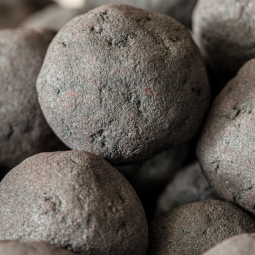LIORC, Canada / Iron ore
View on map
Mined and produced in Newfoundland and Labrador, Canada, the pellets are transported 418km by rail to the port at Sept-Îles, Quebec, where they are shipped to various markets throughout the world.
Producing
Iron ore
Rio Tinto
Canada
Royalty rate and type
Indirect interest in 7% GRR
Balance sheet classification
Royalty financial instrument
Produces premium iron ore pellets and high grade concentrate in Newfoundland and Labrador, Canada. The iron ore pellets are transported 418km by rail to the port at Sept-Îles, Quebec, where they are shipped to various markets throughout the world.
During the year, the Group sold down 50,000 shares in Labrador Iron Ore Royalty Corporation (LIORC), a Toronto-listed company which holds both a royalty and equity interest in the Iron Ore Company of Canada (IOC) operations. This entitles LIORC to revenue from its 7% gross revenue royalty (along with a small commission) on sales from the operation, along with dividend income from its equity stake.
The sale of this equity stake generated approximately $1m. The Group no longer holds a material interest in LIORC.
IOC is operated by Rio Tinto and is one of the top five producers of seaborne iron ore pellets in the world with an expected mine life of over 20 years at current production levels. IOC produces high-quality iron ore pellets which are highly sought after and reduce the carbon footprint of the steel produced. Their quality is supported by the low levels of impurities, noticeably low in phosphorus, alumina and sulphur, which allows them to command a premium price.
As the investment in LIORC is considered to be a part ownership of the royalty, an understanding of the underlying operation and product is important. This was a key focus of our due diligence when considering making this investment.
IOC is one of Canada’s top iron ore producers, operated by Rio Tinto, and is among the top five producers of seaborne iron ore pellets in the world. It is a long-life operation with reserves sufficient for ~25 years at the current rate of production.
The operation extracts ~55Mt of crude ore annually and processes this into concentrate and pellets before transporting it by rail to port at Sept-Îles in Quebec. All of the infrastructure is owned by the operation, another key attraction of this investment. IOC produces a high quality iron ore pellet which is highly sought after due to its efficient use in steel mills, which reduces the carbon footprint of the steel produced. Its quality is supported by its low levels of impurities, being particularly low in phosphorus, alumina and sulphur. These attributes are very desirable, particularly in Asia.
IOC was awarded C$18.1million from the Government of Canada’s Low Carbon Economy Fund to support the decarbonisation of the production of iron ore concentrate and iron ore pellets. IOC’s cumulative greenhouse gas emissions are expected to be reduced by 9% over the life of the project.
The operation had a total 2023 full year production of 9.7Mt (2022: 10.3Mt) of iron ore pellets and concentrate, which was within Rio Tinto’s FY guidance for 2023 (9.3Mt to 9.8Mt) Production was 6% lower than 2022 with challenges due to wildfires in Northern Quebec in the second quarter, as well as extended plant downtime and conveyor belt failures in the third quarter.
LIORC declared total dividends of C$2.55 per share, 18% down on the prior year (2022: C$3.10). During the year, the Group sold ~60% of its residual stake in LIORC realising C$18.9m, a total pre-tax return on investment of c. 110% and a gain on disposal of C$4.1m.
Guidance from LIORC is for saleable production tonnage in 2024 of 16.7Mt to 19.6Mt of iron ore pellets and concentrate.